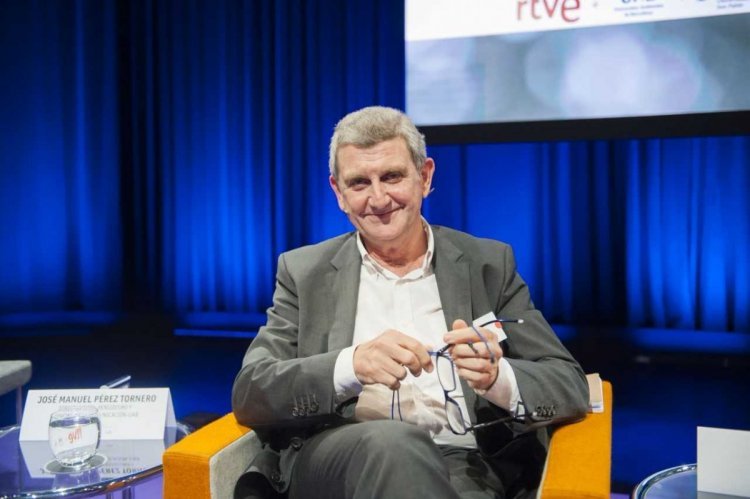On Thursday, July 12, 2018 will present the lines of action of the recently signed Chair of UNESCO of the MIL for Quality Journalism (Medical and Informational Literacy for Quality Journalism). The presentation ceremony is celebrated in the paper under the name Global Understanding (Global Understanding) within the framework of the Summer School Doctoral MILID. It will take place in the Faculty of Communication Sciences of the UAB.
We interviewed José Manuel Pérez Tornero, professor who will lead the newly signed chair and will review the most important challenges surrounding research and activities in the current media and social panorama.
What are the main challenges of the newly created UNESCO Chair on Media Literacy and Quality Journalism?
In order to respond, we must situate ourselves in the singular and critical moment that current journalism is experiencing. It is a very tense moment and full of contradictions.
On the one hand, almost everyone, and in almost the entire world, recognizes the role that journalism plays in our society when it comes to promoting human rights and sustaining democracy. Proof of this is the international success of Spielberg’s latest film, The Post. The film is a kind of epic song to the values it represents and the critical function it has before power. But, on the other hand, it must be recognized that there are many signs that it is increasingly difficult to exercise authentic journalism and that the situation of men and women who practice this profession is increasingly vulnerable.
Let us point out only some of them: the growing difficulty of journalists to exercise their trade in conflict situations where they are threatened and are victims of attacks and premeditated murders – Syria, Afghanistan, Yemen, Nigeria, Mexico, etc. -; the corporate and institutional disruption that has led to precariousness and structural weakness not only to companies, but to professionals; the hegemonic role of social networks that, despite not fulfilling editorial tasks, are imposing their “laws” on the circulation of information; the ease with which truthful information is contaminated and how the circulation of false news grows, trash journalism, the language of hatred; and, to summarize the discredit and lack of confidence in journalism and the media that, gradually and gradually, is spreading among a large part of the world’s population and that may end up undermining the very foundations of coexistence and democracy .
Well, in this context are described the main challenges that the new UNESCO Chair must face. Its fundamental mission is to contribute, from the academic world and the research, to promote quality journalism, and to generate a climate of trust between journalism companies and journalists and their public, that is, among all citizens.
Why include media and information literacy in that mission to enhance the quality of journalism?
For a very simple reason, journalism is not just a matter of journalists. Quality journalism depends on the mutual relationship that is established between the world of journalism -professionals, companies, institutions, etc.- and the readers, spectators or listeners, in short, the citizens. If that relationship is active, respectful, dialoguing, and mutually demanding, there may be quality journalism. But that relationship depends on the skills and abilities of journalists, on the one hand, and that of citizens, on the other. Media literacy consists precisely in empowering citizens – but also journalists and their companies – to exercise critical thinking, to participate in the public sphere and to enhance their creative and expressive capacity.
Thus, the Chair was born with the mission of favoring more active, more demanding publics capable of interacting on an equal footing with journalistic media. We trust that this will improve the exercise of journalism and citizenship.
What activities will be carried out in the chair?
What UNESCO is asking us and we believe is very convenient is that we show the possibilities and ways to improve journalism through media literacy. For that we have to investigate the real problems, propose solutions, apply them and evaluate them. It is a work of innovation and experimentation. In all fields, in technology, pedagogy and education, citizen awareness, social experimentation, etc.
What will be its field of action?
The agreement signed with UNESCO, without excluding any area of the world, speaks of Europe, Arab countries and Latin America preferably. In this sense, we will try to weave strategic alliances and launch global actions. We are interested in universities, research centers, media, etc.
What role can media literacy play in improving journalism?
The accumulated experience in the Communication and Education Cabinet for decades -and that we will now transfer to the Chair- is that media literacy policies are a catalyst in the communication environment. Strengthens the critical sense, improves communication skills and, above all, awareness to the public authorities about the importance of democratic communication. This is what we want, precisely, to promote in relation to journalism.
What will be the immediate actions?
We are going to launch, immediately, two major work programs – that is, we call it areas of activity in which research, innovation and public debate converge, as well as concrete initiatives.
One destined to try to overcome what we call the invisible barriers, that is to say, all the intellectual and cultural aspects that separate people and produce discrimination – of gender, wealth, power, cultures, etc. – and that we will call Global Understanding . In it we will try to find ways in which media literacy and quality journalism can help to destroy those barriers, that is, misinformation and infoxication, the language of hate, stereotypes, different supremacy, many of which extend through the media and journalism. Therefore, quality journalism can help dissolve. In this sense, next July we will organize an international meeting on the subject.
The second will be called News Literacy in Education (InfoEdu) and will promote a series of activities to improve education connecting the world of teaching and journalism.
In each of these programs there will be an infinity of concrete actions that will have international reach.





